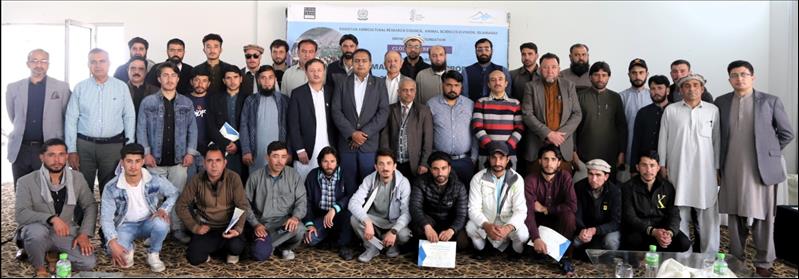
Snow Leopard Foundation Empowers Mountain Communities Through Animal Health Workshop
The workshop, designed to address the critical role of fostering coexistence between agro-pastoral communities and snow leopards in fragile mountain ecosystems, focused on indirect compensation for livestock predation and improving overall ecosystem health. Functioning as a conflict mitigation and management tool, the program aims to increase incomes and tolerance toward snow leopards by minimizing disease-based livestock mortality.
At the closing ceremony, Samar Hussain Khan, Conservator of Wildlife at the Ministry of Climate Change, lauded the initiative. He commended the dedication to training community members as EHWs, emphasizing the direct impact on the welfare of mountain communities and the promotion of healthy mountain ecosystems. Khan praised the efforts of SLF and its partners, highlighting their unwavering commitment to conservation and community development in the region.
Also Read: Unveiling the Invaluable Roles of Women Beyond International Women's Day
Dr. Jaffer Ud Din, Deputy Director of SLF, emphasized the pivotal role of empowering local communities in snow leopard landscapes for sustainable economic growth and biodiversity preservation. He highlighted SLF's two-decade commitment to serving the inhabitants of Gilgit-Baltistan, Azad Jammu and Kashmir, and Chitral. Dr. Jaffar introduced the EHP as an adoption of the“One Health” program, reflecting SLF's holistic approach to conservation.
Veteran Environmentalist, Anthropologist, and Ex-IGF, Dr. Syed Mehmood Nasir, provided valuable insights into the workshop's overview, emphasizing the vital role of livestock health and production in fostering rural development and ensuring ecosystem stability.
Dr. Muhammad Shafeeq from NARC discussed thematic discussions, underscoring the importance of addressing livestock diseases and promoting best practices for healthier communities and ecosystems.
The workshop, held at the highest national standards, covered essential components such as livestock diseases and prevention, vaccine and medicine handling, basic surgical operations, breeding, breed improvement, livestock feeding, yak management, rural poultry and rabbit farming, care and management of young stock, and value addition in livestock.
Certificates and field kits were distributed among the participants, while shields were presented to guests and trainers. The ceremony concluded with a vote of thanks from Dr. Haider Ali, Director of the Animal Science Division of NARC, followed by refreshments.

Legal Disclaimer:
MENAFN provides the
information “as is” without warranty of any kind. We do not accept
any responsibility or liability for the accuracy, content, images,
videos, licenses, completeness, legality, or reliability of the information
contained in this article. If you have any complaints or copyright
issues related to this article, kindly contact the provider above.


















Comments
No comment